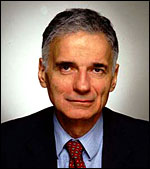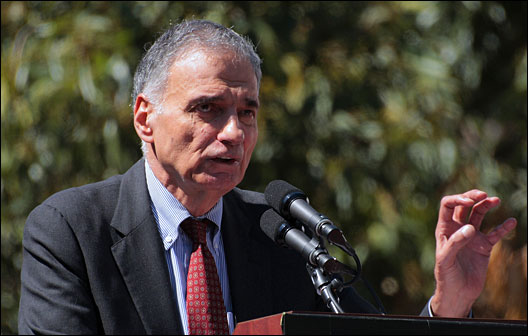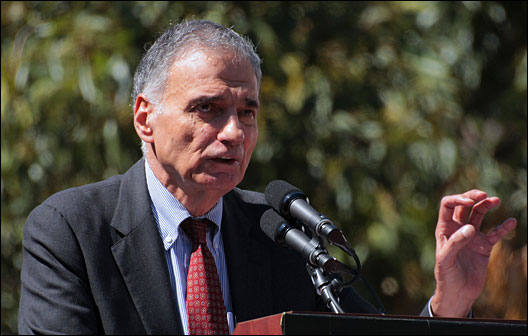Updated 22 Aug 2008

Ralph Nader.
Though Ralph Nader is running as an independent and not under the Green Party banner this time around, he still has some serious small-G green cred (at least among those not still livid over his alleged role in Gore’s 2000 presidential defeat). In the heyday of his consumer advocacy, he and the groups he formed helped get landmark environmental and consumer-protection laws passed, including the Clean Air Act and the Clean Water Act. He has also spent decades fighting nuclear power. These days, Nader regularly decries corporate influence in government and argues against subsidies to nuclear, oil, coal, electric, and biofuels interests. Instead, he calls for heavy investment in solar, wind, and other renewables, as well as in energy efficiency. Nader also advocates for a carbon tax as a way to fight climate change.
Read Grist’s exclusive interview with Nader.
Key Points
- Supports a carbon tax to make polluting fuels and technology more expensive, but hasn’t released details of his plan.
- Calls for phasing out all fossil fuels within 20 to 25 years — coal and oil first, then natural gas.
- Supports raising vehicle fuel-economy standards. In 2000 and 2004, called for increasing standards for cars to 45 miles per gallon and light trucks to 35 mpg, to be phased in over five years.
- Supports solar, wind, tidal, and other sources of renewable power.
- Opposes corn-based ethanol, but supports cellulosic ethanol and other forms of biomass that produce significantly more energy than they consume over their lifecycles.
- Opposes nuclear power, as well as government subsidies and loan guarantees for the nuclear industry.
- Helped form many public-interest nonprofit groups, such as the Public Interest Research Groups (PIRGs), Critical Mass Energy Project, Center for Study of Responsive Law, Public Citizen, and the Center for Auto Safety. Some of these groups then contributed to the birth of the U.S. Environmental Protection Agency, the Consumer Product Safety Commission, and the Occupational Safety and Health Administration, and lobbied Congress [PDF] to implement fuel-economy regulations for vehicles and enact the Superfund law.
- Along with the advocacy groups he helped form, Nader contributed to the creation of many important environmental and consumer-protection laws, including the Clean Air Act, the Clean Water Act, the Safe Drinking Water Act, the Natural Gas Pipeline Safety Act, the Occupational Safety and Health Act, the Wholesome Meat Act, the Whistleblower Protection Act, and the Freedom of Information Act.
- Chose as his running mate Matt Gonzalez, a former Green Party member of the San Francisco Board of Supervisors.
Watch Nader talk about environmental issues on “The Late Show with David Letterman” in January 2008:
Watch Nader announce his 2008 presidential candidacy on NBC’s “Meet the Press” (though nothing environmental is discussed):
- “There’s no such thing as clean coal. Anybody who’s been down in a coal mine knows that. You’ve got to phase out all fossil fuels: first coal and oil, then natural gas.”
— March 9, 2008, in an interview with Grist
- “Nuclear power is rearing its radioactive head. And it demands government guarantees because Wall Street won’t finance nuclear power plants because they’re too risky. And we need to supplant any possibility or resurgence of nuclear power and its deadly radioactive waste with solar energy.”
— Feb. 24, 2008, talking with reporters after his candidacy announcement
- “There is no reason to believe that the [other presidential] candidates will stand up to the commercial interests profiting from our current energy situation. We need a major environmental health agenda that challenges these entrenched interests with major new initiatives in solar energy, doubling motor vehicle fuel efficiency, and other quantified sustainable and clean energy technologies. Nor will there be adequate recognition that current fossil fuels are producing not just global warming, but also cancer, respiratory diseases, and geopolitical entanglements. Finally, there will be no calls for ending environmental racism that leads to more contaminated water, air, and toxic dumps in poorer neighborhoods.”
— Jan. 15, 2008, from an editorial
- “We urge a new clean energy policy that no longer subsidizes entrenched oil, nuclear, electric, and coal mining interests — an energy policy that is efficient, sustainable, and environmentally friendly. We need to invest in a diversified energy policy including renewable energy like wind and other forms of solar power, more efficient automobiles, homes, and businesses — one that breaks our addiction to oil, coal, and atomic power. A new clean energy paradigm means more jobs, more efficiency, greater security, environmental protection, and increased health.”
— 2004, from Nader’s energy platform
- Is outspoken in his opposition to coal; has disparaged mountaintop-removal mining and criticized the Bush administration for what he says is its lax approach to coal-mine safety.
- Supports the legalization of industrial hemp farming in the United States.
- In the 2004 presidential race, praised the Apollo Alliance’s “Ten-Point Plan for Good Jobs and Energy Independence” as “an overdue agenda for the country’s energy future,” though he said it leaned too heavily on tax incentives instead of tax penalties, and put too much emphasis on subsidies instead of “technology-forcing regulation supported by in-house government research and development.”
- Calls for reform of the 1872 Mining Law that allows mining companies to extract minerals from public lands for as little as $2.50 an acre. Says the U.S. should require “a fair-market return to taxpayers for extraction of publicly owned minerals.”
- In 2000, called for the U.S. to ratify the Kyoto Protocol.
- In 2000, advocated for “the immediate cessation of commercial logging on U.S. public lands and the protection from road-building of all 60 million acres of large forest tracts remaining in the national forest system.” Specifically supported protection for the Tongass National Forest in Alaska.
- In 2000, supported increasing the efficiency of energy use in homes, buildings, and industry by 30 percent by 2010.
- In 2000, called for increasing the percentage of U.S. energy coming from renewable sources to at least 25 percent by 2010.
- Has campaigned against nuclear power for decades. In 1991, sought the release of safety reports for the nation’s nuclear power plants. In New York, the safety information, which was generally kept secret, was eventually disclosed to the public.
- In the late ’80s and early ’90s, defended the 55-mile-an-hour speed limit as being safer for drivers and also argued that increasing the limit would increase pollution.
- Authored Unsafe at Any Speed: The Designed-in Dangers of the American Automobile, a classic exposé about the safety defects of cars in the United States and industry’s attempts to avoid making their vehicles safer. Campaigns spurred by the book led to passage of the National Traffic and Motor Vehicle Safety Act in 1966 and the creation of the National Highway Traffic Safety Administration. The book has a chapter on vehicles’ effects on air pollution.
- Read Nader’s official bio.
- Read Outside‘s 1996 interview with Nader.
What did we miss? Tell us below in comments. We’ll update this page as the presidential campaign continues.
Todd Hymas Samkara compiled this fact sheet.



